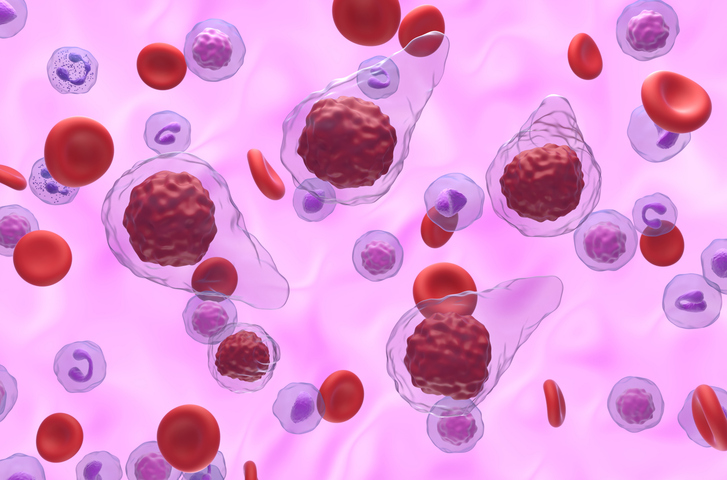
The combination of ruxolitinib and pegylated interferon-alpha2 (IFNα2a) showed significant reductions in spleen length and JAK2 V617F allele burden, according to phase I/II RUXOPeg results presented at the 2022 American Society of Hematology Annual Meeting
The phase I/II RUXOPeg trail was designed to assess the safety and efficacy of ruxolitinib plus in patients with myelofibrosis MF who had never received either drug before.
“Ruxolitinib is the current standard of care improving symptoms and splenomegaly but with little impact on the malignant clone and bone marrow fibrosis. IFNα can reduce mutant allele burden and fibrosis but is poorly tolerated in highly symptomatic patients,” wrote the authors, led by Jean-Jacques Kiladjian, MD, PhD, of the French Intergroup of Myeloproliferative Neoplasms as well as the Center of Clinical Investigations at the Hôpital Saint-Louis in Paris, France.
In phase I, the researchers evaluated possible combinations of ruxolitinib and IFNα; then, in phase II, they tested the two best combinations to assess efficacy and dose-limiting toxicities. The second phase included 19 patients who were randomized between those two dose combinations. Regarding efficacy, the study found that 70% of patients reached the primary efficacy endpoint (reduction of spleen length by at least 50% by 24 weeks), which was maintained through last follow-up at 12 months. In addition, 38% of patients achieved complete resolution of palpable splenomegaly. JAK2 V617F allele burden also decreased, from a median of 84% (range, 23-96) at baseline to 65% (range, 16-95) at six months and 53% (range, 16-92) at 12 months.
Regarding safety, the patients experienced a total of 363 adverse events, of which six were serious. Serious adverse events were skin cancers (2), anemia (2), urinary infection (1), and Raynaud phenomenon (1). The most common adverse events were anemia (18.7%), thrombocytopenia (13.7%), gastrointestinal effects, (7%), musculoskeletal issues (6.8%), and asthenia (6.6%). A small percentage of adverse events (2.5%) led to treatment interruption, and one patient died of transformation to acute myeloid leukemia.
Ongoing analyses are evaluating molecular response, quality of life, symptoms, reduction of bone marrow fibrosis, event-free survival, and overall survival.
“Final results show that the combination provided high rates of important reductions in [spleen length] SL and JAK2 V617F allele burden due to selective targeting of mutated progenitors,” the authors concluded.
Reference
Kiladjian, J-J, Ianotto J-C, Soret J, et al. Final results of RUXOPeg, a phase 1/2 adaptive randomized trial of ruxolitinib (rux) and pegylated interferon alpha (IFNa) 2a in Patients with Myelofibrosis (MF). Abstract #235. Presented at the 64th ASH Annual Meeting and Exposition; December 10-13, 2022; New Orleans, Louisiana.






 © 2025 Mashup Media, LLC, a Formedics Property. All Rights Reserved.
© 2025 Mashup Media, LLC, a Formedics Property. All Rights Reserved.